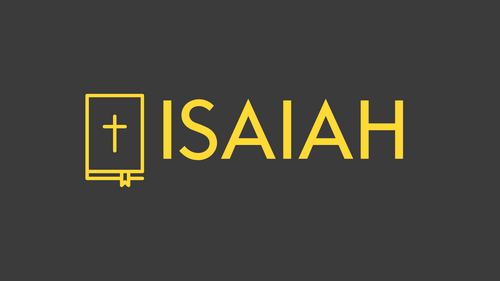Isaiah 34

Today's Passage: Isaiah 34
In the early hours of August 6th, 1945, Colonel Paul Tibbets flew the Enola Gay, a B-29 Superfortress bomber, from the Tinian Airfield to Hiroshima, Japan. After a 6-hour flight, the Enola Gay released its payload, Little Boy. Little Boy, containing about 141 pounds of uranium-235, took 44.4 seconds to fall from the aircraft flying at 31,000 feet to a detonation height of about 1,900 feet above the city.
Hiroshima had experienced countless flyovers by Allied bombers. Many even dropping leaflets warning citizens to evacuate. Other times, it wasn’t leaflets, but bombs. The surprising thing wasn’t that a B-29 overflew Hiroshima, it’s that it was alone—and only dropped a single bomb.
When the atomic bomb, Little Boy, exploded, Hiroshima disappeared. The most destructive force created by man up until that point left only the most hardened concrete structures standing, and many of those in tattered remains. Fires raged from the explosion over a mile in every direction.
The photographer Yoshito Matsushige took the only photographs of Hiroshima immediately after the bombing. He described in a later interview that, immediately after the bombing, "everywhere there was dust; it made a grayish darkness over everything." He took five photographs in total before he could not continue: "It was really a terrible scene. It was just like something out of hell."
As I read Isaiah 34, I couldn’t help but think of the release of the first atomic bomb in war. Much of what I read in this chapter is truly terrifying—"All the host of heaven shall rot away, and the skies roll up like a scroll.” The cosmos is often associated with the pantheon of heavenly beings from a pagan perspective (cf. Matt. 24:29; 2 Pet. 3:10; Rev. 6:13-14). The description of the scroll being rolled back up means their story is over.
“For my sword has drunk its fill in the heavens; behold, it descends for judgment upon Edom, upon the people I have devoted to destruction. The Lord has a sword; it is sated with blood; it is gorged with fat.” This description of the eating and drinking of the Lord’s sword is wild—it consumes until it can consume no more.
Verses 10–17 describe desolation. The wild beasts driven out by a human presence have reclaimed the land. Although Isaiah narrows the focus to Edom (often symbolic of Israel’s enemies), this warning is for the whole world. Verse 16 says clearly, “Seek and read from the book of the Lord”—harkening us back to the warning in verse 1, “Draw near, O nations, to hear… For the Lord is enraged against all the nations.”
Military history states that the dropping of the atomic bombs over Hiroshima and Nagasaki likely saved thousands, if not hundreds of thousands of lives—both American and Japanese. My heart grieves at the tremendous loss of life and the suffering caused by these events. Japan made it illegal for any person to be caught with leaflet dropped by the Americans. I’m grateful for those who heeded that warning and heartbroken over those that didn’t.
In the same way, the Lord is using Isaiah to drop leaflets to warn of what’s coming. To be clear, I don’t think that what we’re reading describes an atomic blast. I think this chapter describes the coming eschatological (end-times) judgment in the period referred to as the Tribulation (Rev 6:8, 9:18). We cannot flee to the hills to escape the destruction, instead, we must flee to the embrace of our Redeemer—our Lord who is Mighty to Save—so that we can escape the coming peril.
Written By: Tyler Short
In the early hours of August 6th, 1945, Colonel Paul Tibbets flew the Enola Gay, a B-29 Superfortress bomber, from the Tinian Airfield to Hiroshima, Japan. After a 6-hour flight, the Enola Gay released its payload, Little Boy. Little Boy, containing about 141 pounds of uranium-235, took 44.4 seconds to fall from the aircraft flying at 31,000 feet to a detonation height of about 1,900 feet above the city.
Hiroshima had experienced countless flyovers by Allied bombers. Many even dropping leaflets warning citizens to evacuate. Other times, it wasn’t leaflets, but bombs. The surprising thing wasn’t that a B-29 overflew Hiroshima, it’s that it was alone—and only dropped a single bomb.
When the atomic bomb, Little Boy, exploded, Hiroshima disappeared. The most destructive force created by man up until that point left only the most hardened concrete structures standing, and many of those in tattered remains. Fires raged from the explosion over a mile in every direction.
The photographer Yoshito Matsushige took the only photographs of Hiroshima immediately after the bombing. He described in a later interview that, immediately after the bombing, "everywhere there was dust; it made a grayish darkness over everything." He took five photographs in total before he could not continue: "It was really a terrible scene. It was just like something out of hell."
As I read Isaiah 34, I couldn’t help but think of the release of the first atomic bomb in war. Much of what I read in this chapter is truly terrifying—"All the host of heaven shall rot away, and the skies roll up like a scroll.” The cosmos is often associated with the pantheon of heavenly beings from a pagan perspective (cf. Matt. 24:29; 2 Pet. 3:10; Rev. 6:13-14). The description of the scroll being rolled back up means their story is over.
“For my sword has drunk its fill in the heavens; behold, it descends for judgment upon Edom, upon the people I have devoted to destruction. The Lord has a sword; it is sated with blood; it is gorged with fat.” This description of the eating and drinking of the Lord’s sword is wild—it consumes until it can consume no more.
Verses 10–17 describe desolation. The wild beasts driven out by a human presence have reclaimed the land. Although Isaiah narrows the focus to Edom (often symbolic of Israel’s enemies), this warning is for the whole world. Verse 16 says clearly, “Seek and read from the book of the Lord”—harkening us back to the warning in verse 1, “Draw near, O nations, to hear… For the Lord is enraged against all the nations.”
Military history states that the dropping of the atomic bombs over Hiroshima and Nagasaki likely saved thousands, if not hundreds of thousands of lives—both American and Japanese. My heart grieves at the tremendous loss of life and the suffering caused by these events. Japan made it illegal for any person to be caught with leaflet dropped by the Americans. I’m grateful for those who heeded that warning and heartbroken over those that didn’t.
In the same way, the Lord is using Isaiah to drop leaflets to warn of what’s coming. To be clear, I don’t think that what we’re reading describes an atomic blast. I think this chapter describes the coming eschatological (end-times) judgment in the period referred to as the Tribulation (Rev 6:8, 9:18). We cannot flee to the hills to escape the destruction, instead, we must flee to the embrace of our Redeemer—our Lord who is Mighty to Save—so that we can escape the coming peril.
Written By: Tyler Short


No Comments